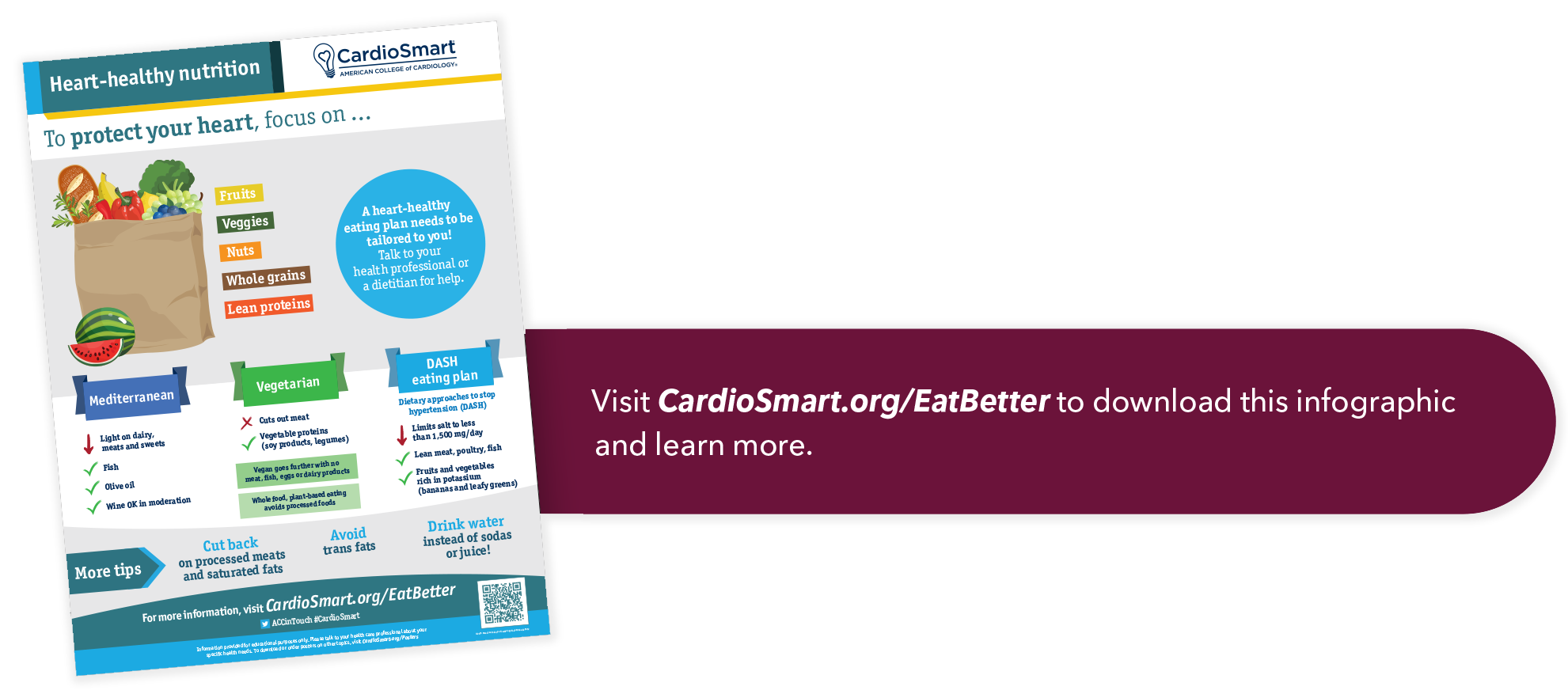Prioritizing Health | Dietary Approaches For Elevated LDL-C

LDL-C is causal for atherosclerotic cardiovascular disease (ASCVD),1 and elevated blood cholesterol affects approximately 100 million U.S. adults.2 Although patients often assume serum LDL-C is entirely genetically predetermined, only a small percentage have severe monogenic disorders. Elevated LDL-C in most adults can be highly impacted by diet quality, the leading behavioral risk factor for preventable death in the U.S.3,4 Professional society guidelines recommend lifestyle management with dietary modification as foundational to management of blood cholesterol in all adults.5-8
According to the ACC/American Heart Association (AHA) guideline, all adults should undergo cholesterol screening to help assess long-term cardiovascular risk.5,6 Serum LDL-C levels <100 mg/dL are considered desirable for adults without ASCVD,5,9-11 though lower levels may further reduce the risk of developing atherosclerosis.12-14 Though non–HDL-C and apolipoprotein B are better predictors of cardiovascular risk,5,15,16 dietary changes that lower LDL-C also lower these measures.
Dietary fats are a major modifier of serum LDL-C. Data from basic science, metabolic ward and cohort studies as well as randomized clinical trials (RCTs) have demonstrated that higher intake of saturated fats (SFA) raises LDL-C and increases the risk of ASCVD when they replace unsaturated fats or high-fiber carbohydates.17-21 For example, a meta-analysis of the highest quality RCTs from an AHA Scientific Statement showed that SFA replacement with unsaturated fats reduced cardiovascular disease risk by approximately 30%.18
SFA are typically solid at room temperature, and high amounts are found in animal products (e.g., fatty meat, pork lard, beef tallow and dairy fat) and tropical oils (coconut and palm oils).22 Though not widely used in home cooking, palm oil is commonly consumed in processed foods and snacks (e.g., cakes, pies, cookies, muffins, doughnuts) and plant-based margarines/butters.
Key Points For Clinicians
- Diet and lifestyle modification is the cornerstone of dyslipidemia management and prevention, regardless of cardiovascular risk.
- Promote diets rich in fiber from vegetables, fruits, legumes, whole grains, nuts and seeds.
- Recommend replacing foods high in saturated fats with those high in unsaturated fats and/or fiber.
- High-fiber plant-based diets such as the Portfolio diet have consistently demonstrated the greatest LDL-C reductions, while vegan/vegetarian, DASH and plant-based Mediterranean diets can lead to smaller reductions in LDL-C which also improve ASCVD outcomes.
Key Messages For Patients
- Dietary patterns that consistently have the greatest impact on LDL-C reduction have high intake of whole plant foods and are low in saturated fat.
- Eat a wide variety of vegetables, fruits, legumes, whole grains and nuts every day, including oats, barley, legumes, soy protein, nuts and other plant-based foods high in soluble fiber.
- Reduce and limit or eliminate foods high in saturated fat, including red meat, pork, processed meats (e.g., bacon, ham, salami, sausages, hot dogs), butter, cream and processed foods containing palm oil or coconut oil.
- For home cooking and baking, use liquid vegetable oils instead of solid fats like butter or coconut oil.
As a first-line recommendation, the AHA and the National Lipid Association recommend SFA be limited to <7% of total daily calories for all adults.23,24 Industrial trans-fats from partially hydrogenated oils also elevate serum LDL-C, but U.S. intake has fallen dramatically since the enactment of public policy measures.25,26
Unsaturated fats are typically liquid at room temperature and consist of monounsaturated fats (MUFA) and polyunsaturated fats (PUFA). PUFA and to a lesser degree MUFA lower LDL-C when replacing equivalent calories from SFA.17-21 Plant-based sources of PUFA/MUFA include nuts, seeds, avocado and liquid vegetable oils (e.g., olive, canola, soybean, corn, sunflower). Despite publicized claims that seed oils are inherently harmful, clinical studies consistently demonstrate that they reduce LDL-C and lower cardiovascular risk when used in place of foods high in SFA (e.g., butter, tallow) and do not increase markers of inflammation.17,18,27-39
Dietary fiber also plays an important role in determining serum LDL-C and is found exclusively in plants (fruits, vegetables, legumes, grains, nuts and seeds). Fiber may be soluble or insoluble, and both types are found in most plant foods. Soluble fibers have a greater impact on lowering LDL-C, and are relatively higher in legumes, fruits, vegetables, barley and oats.40,41 Despite the benefits of dietary fiber on LDL-C-lowering and reducing cardiovascular risk, approximately 95% of Americans do not consume the minimum recommended intake of at least 14 grams per 1,000 calories (at least about 25 grams for women and about 38 grams for men daily).23,42
Consistent with the evidence, plant-predominant dietary patterns that are low in SFA and high in fiber result in the greatest LDL-C reductions. The Portfolio diet is a high-fiber (>70 grams/day) plant-based diet that includes multiple foods shown to independently lower LDL-C, including soy protein and legumes, nuts and seeds, vegetables high in viscous fiber, and MUFA. The Portfolio diet can reduce LDL-C by as much as 35%.43-45 Similar or greater LDL-C reductions have been seen with other high-fiber plant-based diets.46-49
More generally, vegetarian, vegan and primarily plant-forward diets can reduce LDL-C compared to most dietary patterns. Meta-analyses show vegetarian diets lower LDL-C by 13 mg/dL in RCTs and are associated with a 23 mg/dL lower LDL-C in observational studies.50,51 The Dietary Approaches to Stop Hypertension (DASH) diet promotes eating fruits, vegetables, whole grains and low-fat dairy, and limiting foods high in SFA, sodium and added sugar.52-54 Compared with a typical American diet, DASH can lower LDL-C by an average of 11 mg/dL.53,54 Although these changes in LDL-C seem small, their cumulative effects over time are likely large based on Mendelian randomization studies.1
The Mediterranean diet promotes high intake of fruits, vegetables, whole grains, nuts, legumes and olive oil; moderate intake of fish, dairy and poultry; and low intake of red meat and sweets.55,56 Although some forms of the Mediterranean diet frequently have little to no effect on LDL-C, more plant-based versions can lower LDL-C and the higher polyphenolic content of the diet likely contributes to nonlipid benefits.57-61
Even though most clinicians are limited by inadequate nutrition education and/or time, diet counseling is foundational to improving LDL-C and ASCVD outcomes. Even brief messages have been shown to improve diet quality, and simple recommendations can include limiting ultra-processed foods, substituting nontropical plant-based fats for animal fats, and eating fiber-rich whole grains in place of refined grains.
Lifestyle behavior change can also be facilitated by utilizing SMART goals (Specific, Measurable, Achievable, Relevant and Time-Based). Patients can be referred to a registered dietitian nutritionist (RDN), reimbursable for many adults including Medicare patients with diabetes or chronic kidney disease, or with certain Medicare Advantage plans.
ASCVD patients also should be referred to cardiac rehabilitation, where reducing SFA is emphasized and RDNs typically hold sessions on reading nutrition labels. High fiber and low SFA intake can be tailored to cultural/social preferences, financial considerations and culinary skillsets.
This article was authored by Emily S. Fishman, MD, and Alexander P. Ambrosini, MD, Yale School of Medicine, Yale University, New Haven, CT; Ashley Waring, MD, FACC, Medical University of South Carolina, Charleston, SC; and Karen E. Aspry, MD, MS, FACC, Alpert Medical School, Brown University, Providence, RI; and Kamil F. Faridi, MD, MSc, Yale School of Medicine.
References
- Ference BA, Ginsberg HN, Graham I, et al. Low-density lipoproteins cause atherosclerotic cardiovascular disease. 1. Evidence from genetic, epidemiologic, and clinical studies. A consensus statement from the European Atherosclerosis Society Consensus Panel. Eur Heart J. Aug 21 2017;38(32):2459-2472.
- Tsao CW, Aday AW, Almarzooq ZI, et al. Heart disease and stroke statistics-2023 Update: a report from the American Heart Association. Circulation. 2023;147(8):e93-e621.
- Mensah GA, Fuster V, Murray CJL, Roth GA. Global burden of cardiovascular diseases and risks, 1990-2022. J Am Coll Cardiol. 2023;82(25):2350-2473.
- Collaborators GBDD. Health effects of dietary risks in 195 countries, 1990-2017: a systematic analysis for the Global Burden of Disease Study 2017. Lancet. 2019;393(10184):1958-1972.
- Grundy SM, Stone NJ, Bailey AL, et al. 2018 AHA/ACC/ guideline on the management of blood cholesterol: executive summary J Am Coll Cardiol. 2019;73(24):3168-3209.
- Mach F, Baigent C, Catapano AL, et al. 2019 ESC/EAS guidelines for the management of dyslipidaemias: lipid modification to reduce cardiovascular risk. Eur Heart J. 2020;41(1):111-188.
- Lichtenstein AH, Appel LJ, Vadiveloo M, et al. 2021 dietary guidance to improve cardiovascular health: a scientific statement from the American Heart Association. Circulation. 2021;144(23):e472-e487.
- Lloyd-Jones DM, Morris PB, et al. 2022 ACC expert consensus decision pathway on the role of nonstatin therapies for ldl-cholesterol lowering in the management of atherosclerotic cardiovascular disease risk. J Am Coll Cardiol. 2022;80(14):1366-1418.
- National Cholesterol Education Program Expert Panel. Third report of the National Cholesterol Education Program (NCEP) Expert Panel on Detection, Evaluation, and Treatment of High Blood Cholesterol in Adults (Adult Treatment Panel III) final report. Circulation. Dec 17 2002;106(25):3143-421.
- Expert Dyslipidemia Panel of the International Atherosclerosis Society Panel. An International Atherosclerosis Society position paper: global recommendations for the management of dyslipidemia--full report. J Clin Lipidol. Jan-Feb 2014;8(1):29-60.
- Jacobson TA, Ito MK, Maki KC, et al. National lipid association recommendations for patient-centered management of dyslipidemia: part 1--full report. J Clin Lipidol. Mar-Apr 2015;9(2):129-69.
- O'Keefe JH, Jr., Cordain L, Harris WH, et al. Optimal low-density lipoprotein is 50 to 70 mg/dl: lower is better and physiologically normal. J Am Coll Cardiol. 2004;43(11):2142-6.
- Fernandez-Friera L, Fuster V, Lopez-Melgar B, et al. Normal LDL-cholesterol levels are associated with subclinical atherosclerosis in the absence of risk factors. J Am Coll Cardiol. 2017;70(24):2979-2991.
- Faridi KF, Lahan S, Budoff MJ, et al. serum lipoproteins are associated with coronary atherosclerosis in asymptomatic u.s. adults without traditional risk factors. JACC Adv. 2024;3(7):101049.
- Raja V, Aguiar C, Alsayed N, et al. Non-HDL-cholesterol in dyslipidemia: Review of the state-of-the-art literature and outlook. Atherosclerosis. 2023;383:117312.
- Sniderman AD, Navar AM, Thanassoulis G. Apolipoprotein B vs low-density lipoprotein cholesterol and non-high-density lipoprotein cholesterol as the primary measure of apolipoprotein b lipoprotein-related risk: the debate is over. JAMA Cardiol. 2022;7(3):257-258.
- Clarke R, Frost C, Collins R, Appleby P, Peto R. Dietary lipids and blood cholesterol: quantitative meta-analysis of metabolic ward studies. BMJ. 1997;314(7074):112-7.
- Sacks FM, Lichtenstein AH, Wu JHY, et al. Dietary fats and cardiovascular disease: a presidential advisory From the American Heart Association. Circulation. 2017;136(3):e1-e23.
- Christensen JJ, Arnesen EK, Rundblad A, et al. Dietary fat quality, plasma atherogenic lipoproteins, and atherosclerotic cardiovascular disease: An overview of the rationale for dietary recommendations for fat intake. Atherosclerosis. 2024;389:117433.
- Mensink RP, Zock PL, Kester AD, Katan MB. Effects of dietary fatty acids and carbohydrates on the ratio of serum total to HDL cholesterol and on serum lipids and apolipoproteins: a meta-analysis of 60 controlled trials. Am J Clin Nutr. 2003;77(5):1146-55.
- Li Y, Hruby A, Bernstein AM, et al. Saturated fats compared with unsaturated fats and sources of carbohydrates in relation to risk of coronary heart disease: a prospective cohort study. J Am Coll Cardiol 2015;66(14):1538-1548.
- Saturated Fat. American Heart Association. Updated August 23, 2024. Accessed April 7, 2025. Avalable here.
- Van Horn L, Carson JA, Appel LJ, et al. Recommended dietary pattern to achieve adherence to the american heart association/american college of cardiology (aha/acc) guidelines: a Scientific Statement From the American Heart Association. Circulation. 2016;134(22):e505-e529. doi:10.1161/CIR.0000000000000462
- Jacobson TA, Maki KC, Orringer CE, et al. National Lipid Association recommendations for patient-centered management of dyslipidemia: Part 2. J Clin Lipidol. 2015;9(6 Suppl):S1-122 e1.
- Mozaffarian D, Katan MB, Ascherio A, Stampfer MJ, Willett WC. Trans fatty acids and cardiovascular disease. N Engl J Med. 2006;354(15):1601-13.
- Trans Fat. U.S. Food & Drug Administration. Updated April 30, 2024. Accessed April 4th, 2025. Available here.
- Petersen KS, Maki KC, Calder PC, et al. Perspective on the health effects of unsaturated fatty acids and commonly consumed plant oils high in unsaturated fat. Br J Nutr. 2024;132(8):1039-1050.
- Mousavi SM, Jalilpiran Y, Karimi E, et al. Dietary Intake of Linoleic Acid, Its Concentrations, and the Risk of Type 2 Diabetes: A Systematic Review and Dose-Response Meta-analysis of Prospective Cohort studies. Diabetes Care. 2021;44(9):2173-2181.
- Su H, Liu R, Chang M, Huang J, Wang X. Dietary linoleic acid intake and blood inflammatory markers: a systematic review and meta-analysis of randomized controlled trials. Food Funct. 2017;8(9):3091-3103.
- Marklund M, Wu JHY, Imamura F, et al. Biomarkers of dietary omega-6 fatty acids and incident cardiovascular disease and mortality. Circulation. 2019;139(21):2422-2436.
- Hooper L, Martin N, Jimoh OF, et al. Reduction in saturated fat intake for cardiovascular disease. Cochrane Database Syst Rev. 2020;8(8):CD011737.
- Zhang Y, Chadaideh KS, Li Y, et al. Butter and Plant-Based Oils Intake and Mortality. JAMA Intern Med. Mar 6 2025;doi:10.1001/jamainternmed.2025.0205
- Li J, Guasch-Ferre M, Li Y, Hu FB. Dietary intake and biomarkers of linoleic acid and mortality: systematic review and meta-analysis of prospective cohort studies. Am J Clin Nutr. Jul 1 2020;112(1):150-167.
- Park S, Lee S, Kim Y, et al. Causal effects of serum levels of n-3 or n-6 polyunsaturated fatty acids on coronary artery disease: mendelian randomization study. Nutrients. 2021;13(5)doi:10.3390/nu13051490
- Bjermo H, Iggman D, Kullberg J, et al. Effects of n-6 PUFAs compared with SFAs on liver fat, lipoproteins, and inflammation in abdominal obesity: a randomized controlled trial. Am J Clin Nutr. 2012;95(5):1003-12.
- Imamura F, Micha R, Wu JH, et al. Effects of saturated fat, polyunsaturated fat, monounsaturated fat, and carbohydrate on glucose-insulin homeostasis: a systematic review and meta-analysis of randomised controlled feeding trials. PLoS Med. 2016;13(7):e1002087.
- Rosqvist F, Iggman D, Kullberg J, et al. Overfeeding polyunsaturated and saturated fat causes distinct effects on liver and visceral fat accumulation in humans. Diabetes. Jul 2014;63(7):2356-68.
- Farvid MS, Ding M, Pan A, et al. Dietary linoleic acid and risk of coronary heart disease: a systematic review and meta-analysis of prospective cohort studies. Circulation. 2014;130(18):1568-78.
- Willliamson L. There's no reason to avoid seed oils and plent of reasons to eat them. American Heart Association. Updated March 27, 2025. Accessed April 7, 2025. Available here.
- Ghavami A, Ziaei R, Talebi S, et al. soluble fiber supplementation and serum lipid profile: a systematic review and dose-response meta-analysis of randomized controlled trials. Adv Nutr. 2023;14(3):465-474.
- Brown L, Rosner B, Willett WW, Sacks FM. Cholesterol-lowering effects of dietary fiber: a meta-analysis. Am J Clin Nutr. 1999;69(1):30-42. doi:10.1093/ajcn/69.1.30
- Cifuentes L, O'Keefe S. Analysis of 1999-2017 NHANES Data: Minimal Increase and Racial Disparities in U.S. Fiber Consumption Over 18 years. Nutr Cancer. 2024;76(4):345-351.
- Jenkins DJ, Kendall CW, Marchie A, et al. Effects of a dietary portfolio of cholesterol-lowering foods vs lovastatin on serum lipids and C-reactive protein. JAMA. 2003;290(4):502-10.
- Jenkins DJ, Kendall CW, Marchie A, et al. Direct comparison of a dietary portfolio of cholesterol-lowering foods with a statin in hypercholesterolemic participants. Am J Clin Nutr. Feb 2005;81(2):380-7.
- Jenkins DJ, Kendall CW, Marchie A, et al. The effect of combining plant sterols, soy protein, viscous fibers, and almonds in treating hypercholesterolemia. Metabolism 2003;52(11):1478-83.
- Soare A, Khazrai YM, Del Toro R, et al. The effect of the macrobiotic Ma-Pi 2 diet vs. the recommended diet in the management of type 2 diabetes: the randomized controlled MADIAB trial. Nutr Metab (Lond). 2014;11:39.
- Jenkins DJ, Kendall CW, Popovich DG, et al. Effect of a very-high-fiber vegetable, fruit, and nut diet on serum lipids and colonic function. Metabolism. 2001;50(4):494-503.
- Hall KD, Guo J, Courville AB, et al. Effect of a plant-based, low-fat diet versus an animal-based, ketogenic diet on ad libitum energy intake. Nat Med. 2021;27(2):344-353.
- Ornish D, Scherwitz LW, Billings JH, et al. Intensive lifestyle changes for reversal of coronary heart disease. JAMA. 1998;280(23):2001-7.
- Wang F, Zheng J, Yang B, Jiang J, Fu Y, Li D. Effects of vegetarian diets on blood lipids: a systematic review and meta-analysis of randomized controlled trials. J Am Heart Assoc. 2015;4(10):e002408.
- Yokoyama Y, Levin SM, Barnard ND. Association between plant-based diets and plasma lipids: a systematic review and meta-analysis. Nutr Rev. Sep 1 2017;75(9):683-698.
- Appel LJ, Moore TJ, Obarzanek E, et al. A clinical trial of the effects of dietary patterns on blood pressure. DASH Collaborative Research Group. N Engl J Med. 1997;336(16):1117-24.
- Appel LJ, Sacks FM, Carey VJ, et al. Effects of protein, monounsaturated fat, and carbohydrate intake on blood pressure and serum lipids: results of the OmniHeart randomized trial. JAMA. Nov 16 2005;294(19):2455-64.
- Eckel RH, Jakicic JM, Ard JD, et al. 2013 AHA/ACC guideline on lifestyle management to reduce cardiovascular risk: a report of the American College of Cardiology/American Heart Association Task Force on Practice Guidelines. J Am Col Cardiol 2024;63:2960-2984.
- Pallazola VA, Davis DM, Whelton SP, et al. A Clinician's Guide to Healthy Eating for Cardiovascular Disease Prevention. Mayo Clin Proc Innov Qual Outcomes. 2019;3(3):251-267.
- de Lorgeril M, Salen P, Martin JL, Monjaud I, Delaye J, Mamelle N. Mediterranean diet, traditional risk factors, and the rate of cardiovascular complications after myocardial infarction: final report of the Lyon Diet Heart Study. Circulation. 1999;99(6):779-85.
- Nordmann AJ, Suter-Zimmermann K, Bucher HC, et al. Meta-analysis comparing Mediterranean to low-fat diets for modification of cardiovascular risk factors. Am J Med. 2011;124(9):841-51 e2.
- Rees K, Takeda A, Martin N, et al. Mediterranean-style diet for the primary and secondary prevention of cardiovascular disease. Cochrane Database Syst Rev. 2019;3(3):CD009825.
- Lopez-Moreno M, Fresan U, Del Coso J, et al. The OMNIVEG STUDY: Health outcomes of shifting from a traditional to a vegan Mediterranean diet in healthy men. A controlled crossover trial. Nutr Metab Cardiovasc Dis. 2024;34(12):2680-2689.
- Sofi F, Dinu M, Pagliai G, et al. Low-calorie vegetarian versus mediterranean diets for reducing body weight and improving cardiovascular risk profile: CARDIVEG Study (Cardiovascular Prevention With Vegetarian Diet). Circulation. 2018;137(11):1103-1113.
- Ferro Y, Mazza E, Salvati M, et al. Effects of a portfolio-mediterranean diet and a mediterranean diet with or without a sterol-enriched yogurt in individuals with hypercholesterolemia. Endocrinol Metab (Seoul). 2020;35(2):298-307.
Clinical Topics: Dyslipidemia, Prevention, Lipid Metabolism, Nonstatins, Diet
Keywords: Cardiology Magazine, ACC Publications, Diet, Dietary Fats, Heart Disease Risk Factors, Cholesterol, LDL, Atherosclerosis


